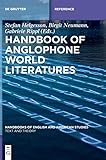Handbook of Anglophone World Literatures / ed. by Stefan Helgesson, Birgit Neumann, Gabriele Rippl.
Material type: TextSeries: Handbooks of English and American Studies : Text and Theory ; 13Publisher: Berlin ; Boston : De Gruyter, [2020]Copyright date: ©2020Description: 1 online resource (IX, 580 p.)Content type:
TextSeries: Handbooks of English and American Studies : Text and Theory ; 13Publisher: Berlin ; Boston : De Gruyter, [2020]Copyright date: ©2020Description: 1 online resource (IX, 580 p.)Content type: - 9783110580846
- 9783110580945
- 9783110583182
- online - DeGruyter
- Issued also in print.
| Item type | Current library | Call number | URL | Status | Notes | Barcode | |
|---|---|---|---|---|---|---|---|
 eBook
eBook
|
Biblioteca "Angelicum" Pont. Univ. S.Tommaso d'Aquino Nuvola online | online - DeGruyter (Browse shelf(Opens below)) | Online access | Not for loan (Accesso limitato) | Accesso per gli utenti autorizzati / Access for authorized users | (dgr)9783110583182 |
Frontmatter -- Editors’ Preface -- Contents -- 0 Introduction -- Part I: Historical Approaches – Genealogies of World Literatures -- 1 The Beginnings of the Concept (Goethe, Marx, Said) – Readings from a Postcolonial Perspective -- 2 Re-Reading Classical Approaches from a Postcolonial Perspective: Pascale Casanova, Franco Moretti, David Damrosch -- 3 Macaulay’s Magic Hat: The Colonial Education System and the Canon of World Literature -- 4 The King’s English and the Mother Tongue -- 5 Rethinking English Studies -- Part II: Concepts and Methods of Anglophone World Literatures -- 6 Global Literature, World Literature and Worlding Literature: Some Conceptual Differences -- 7 Barbarians: Cosmopolitanism Beyond the Center-Periphery Model -- 8 Anglophone World Literatures and World Ecologies (Environmental Humanities) -- 9 Anglophone World Literatures and Transcultural Memory -- 10 Anglophone World Literatures and Translation -- 11 Comparative Literature -- 12 Genres of Anglophone World Literatures -- 13 Decolonizing World Literature through Orality -- 14 Intermediality and Remediation -- Part III: Sociological Approaches – Distribution, Reception and Translation of Anglophone World Literature -- 15 Marketing Anglophone World Literatures -- 16 Canons and Canonicity in Anglophone Literature -- 17 Teaching Anglophone World Literature -- 18 Anglophone World Literatures, the Internet and the Digital Humanities -- Part IV: Literary Worlds – Locations and Orientations -- 19 Britain -- 20 Ireland -- 21 USA -- 22 Canada -- 23 The Oceans -- 24 The Caribbean -- 25 Southern Africa -- 26 West Africa -- 27 East Africa -- 28 South Asia -- 29 Southeast Asia (Hong Kong and Singapore) -- 30 Australia -- 31 New Zealand Literature and the World -- Name Index -- Subject Index -- List of Contributors
restricted access online access with authorization star
http://purl.org/coar/access_right/c_16ec
The Handbook of Anglophone World Literatures is the first globally comprehensive attempt to chart the rich field of world literatures in English. Part I navigates different usages of the term ‘world literature’ from an historical point of view. Part II discusses a range of theoretical and methodological approaches to world literature. This is also where the handbook’s conceptualisation of ‘Anglophone world literatures’ – in the plural – is developed and interrogated in juxtaposition with proximate fields of inquiry such as postcolonialism, translation studies, memory studies and environmental humanities. Part III charts sociological approaches to Anglophone world literatures, considering their commodification, distribution, translation and canonisation on the international book market. Part IV, finally, is dedicated to the geographies of Anglophone world literatures and provides sample interpretations of literary texts written in English.
Issued also in print.
Mode of access: Internet via World Wide Web.
In English.
Description based on online resource; title from PDF title page (publisher's Web site, viewed 25. Jun 2024)


